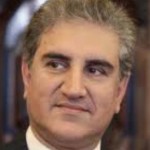Islamabad Calls for Political Solution in Afghanistan as Taliban Encircles Kabul

Pakistani Foreign Minister Shah Mahmood Qureshi
Michael Hughes
June 2, 2021
Is Islamabad once again playing a slick double game? Pakistani military and diplomatic leaders continue to claim publicly that the only way to end the Afghan conflict is via a peaceful political resolution just as their alleged minions, the Taliban, are by the hour positioning themselves to capture Kabul.
Given the situation on the ground the statements emanating from Pakistani officials seem, at a minimum, “tone deaf,” albeit it is difficult to measure the extent of Islamabad’s control over the insurgents at this point.
VENEEER OF DIPLOMACY
On June 1, Pakistani Foreign Minister Shah Mahmood Qureshi told the speaker of Afghanistan’s lower house, Mir Rahman Rahmani, that Islamabad believes the only way to end the conflict in Afghanistan is through a political settlement.
“The Foreign Minister expressed hope that the Afghan parties would seize this historic opportunity and workout an inclusive, broad-based and comprehensive political settlement for durable peace and stability in Afghanistan and the region,” Pakistan’s Foreign Ministry said in a statement released after Qureshi received Rahmani, who is participating in a parliamentary cooperation conference.
Meanwhile, Qureshi also reportedly told Pakistani lawmakers that Islamabad would not support a Taliban military takeover of Kabul. “This is our stance in principle,” Qureshi said, as quoted by The Times of India on June 2.
Pakistani Army Chief General Qamar Javed Bajwa, meanwhile, has gone on record to say a peaceful Afghanistan means a peaceful Pakistan.
“We will always support ‘Afghan led-Afghan owned’ Peace Process based on mutual consensus of all stakeholders,” Bajwa said in a statement on May 11.
This is crucial, if true, given the army, after all, is the only establishment inside Pakistan that has any capacity to influence the insurgents.
Meanwhile, Washington seems hopeful that Pakistan can persuade the Taliban to engage in intra-Afghan talks in Istanbul. Yet there are conflicting signals regarding who is in charge – the Taliban or Rawalpindi – and whether or not the U.S. confidence is misplaced.
In an interesting move, Pakistani officials quickly shot down reports recently that the U.S. might establish bases in Pakistan post-withdrawal. The move shows a naïveté on the part of the U.S., but the fact the Americans thought it was a good idea to ask in the first place also perhaps reflects some ambivalence within the Pakistani establishment.
At the end of the day, although Pakistan certainly wants to see the Taliban hold sway in Kabul, do they fear their creation has broken free from the leash?
TALIBAN ADVANCES
The Taliban movement has made significant military gains since the Americans began withdrawing on May 1, which includes capturing critical districts near Kabul, the U.S. state-funded RFE/RL reported on June 1. This has increased fears that the insurgents could quickly topple the Afghan government once all foreign forces have left.
In the past month alone, the Taliban seized two districts in the central province of Maidan Wardak, which is 40 kilometers from the capital city, the report added. The insurgents also took one district in the eastern province of Laghman and another in the northern province of Baghlan.
According to the Long War Journal, about 24 percent of Afghanistan’s 398 districts are in government hands while the Taliban command some 22%, with the rest contested. In addition to Kabul, Afghan government forces, for now, control provincial capitals, major population centers, and most district centers, the LWJ map shows.
The noose is certainly tightening around the Ghani government as the insurgents’ bravado seems to grow.
Former UK diplomat Tim Willasey-Wilsey, citing a source close to the Taliban, said the insurgents have no intention of reaching a compromise with the Afghan government and are confident they can topple Kabul “within days” of the NATO exit.
PEACE PROCESS COMPLICATIONS
Willasey-Wilsey also suggested that Bajwa’s power to get the Taliban to heel or negotiate is quite limited as evidenced by the militant group scoffing at the notion of holding talks in Istanbul and being able to dictate terms to both Islamabad and the international community.
Far from being revered by the Taliban, he explained, Turkish President Recep Tayyip Erdogan is seen with deep suspicion given his support for former Northern Alliance commander Rashid Dostum.
“Furthermore, the efforts of… Bajwa to persuade the Taliban to attend Istanbul allegedly risk weakening the Pakistan Army’s future leverage over the Taliban,” he said in an article for The Cipher Brief posted on June 1.
The Afghan government, moreover, does not appear excited to negotiate with the Taliban at all. In fact, Kabul has claimed that the insurgent movement is leaderless and negotiations would be a futile exercise.
On May 29, Afghan National Security Advisor Hamdullah Mohib claimed the insurgents have had no contact with Taliban supreme leader Mullah Haibatullah Akhund, although insurgent officials said he is alive and well.
“There is no information available whether he is alive or dead. No one has heard his voice and no one had met him. Intelligence information proves it,” Mohib said as quoted by Pajhwok Afghan News on May 29.
Other government officials, however, have acknowledged that the group’s real power is now in the hands of deputy leader Sarajuddin Haqqani.
So, the guessing game about who has the power continues.
One thing we do know is that Washington is sure to be nearly powerless soon – with Kabul likely to follow suit.
